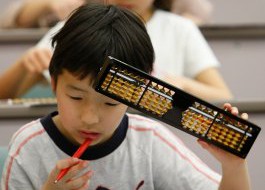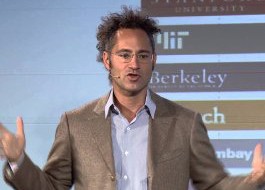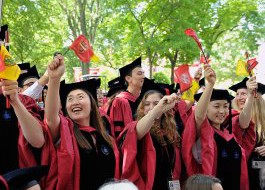
It’s the annual university rankings season, and if you are a student or alumnus of one of Asia’s big-name universities, you may be struggling to contain that smug look.
National school systems in Japan, South Korea, Singapore and Hong Kong have for years held an iron grip on the top rungs of global performance charts, but now the leading tertiary institutions from these East Asian societies are joining the fray and giving prestigious Western counterparts a run for their money.
Separate league tables released in September by the closely-followed varsity ranking rivals Times Higher Education (THE) and Quacquarelli Symonds (QS) showed the region’s best universities consolidating their positions near the top of the global pile.
The National University of Singapore (NUS) rose to 24th in the THE ranking – its highest ever – and making it Asia’s top university for the second year running. It bested the likes of the London School of Economics and New York University in the list topped by Oxford University.
The University of Hong Kong (HKU), the Hong Kong University of Science and Technology (HKUST), Singapore’s Nanyang Technological University (NTU), Peking University, Seoul National University and the University of Tokyo also featured as among the best in the world in both rankings.
Their students may be cheering, but for some academics, the growing fixation with rankings among university administrators is a matter of serious concern.
Most university rankings put a heavy emphasis on research rather than teaching. Academics say this puts undue pressure on them to churn out journal articles in order to increase their citation count, while neglecting interactions with students and the wider community.
“The wholesale adoption of university rankings raises important challenges for how we go about conducting our work as academics, how we evaluate this work, and the impact of this work in communities,” said Mohan J. Dutta, the head of the communications and new media department at Singapore’s NUS.
“A parochial emphasis on citations fails to take into account the much needed role that universities ought to play in impacting societies and communities,” said Dutta, a health communication scholar who has worked closely with marginalised groups in Singapore and India.
 A view of the Nanyang Technological University campus in Singapore July 29, 2016. Reuters/Edgar Su
A view of the Nanyang Technological University campus in Singapore July 29, 2016. Reuters/Edgar Su
Critics also charge that the university rankings – dominated by British and American institutions with deep endowment funds – only serve to reflect the wealth gap between first world and emerging economies.
“It’s what I call the Manchester United effect. You have got lots of money, you are going to hire the best staff and you will have students coming in from high socio-economic levels…ipso facto you are going to have the best outcomes,” said Ellen Hazelkorn, an Ireland-based researcher and higher education policy adviser who authored the book Global Rankings and the Geopolitics of Higher Education.
The ranking agencies, however, say such criticism is unfair because it ignores the incremental changes they have introduced to their respective metrics in order to make them more sensitive to socio-economic differences among regions.
“It is true that being well funded is a massive advantage in any of the overall international rankings,” said Ben Sowter, head of research at QS.
But the firm’s stratified rankings – it has separate league tables for five regions, five faculty areas and 42 subjects – allow a large number of institutions to be recognised for their strengths, he said.
And Phil Baty, editor of the THE World University Rankings, said “pursuing the metrics of the rankings will directly lead to real-world improvements.”
The THE rankings, which were compiled in partnership with QS until the two agencies split in 2010, derives 30 per cent of each institution’s score from five indicators of teaching quality.
QS, on the other hand, derives 20 per cent of each institution’s score from teaching quality – which it measures simply by the ratio of students to faculty.
Baty, without naming rivals, said THE’s ranking methodology was superior to “many other, more simple, more crude university rankings, which employ fewer metrics [and are therefore] much easier to manipulate and game”.
Leading Asian universities approached by This Week in Asia said they appreciated the recognition accorded by the rankings but did not chase it.
“While we are pleased with our steady performance in world university rankings, our university does not set its strategies based on these and rankings are not one of our key performance indicators,” said an NUS spokesman.
A spokeswoman for HKUST said: “We have never used rankings to drive our academics.”
But “different rankings have always been a reference for us to measure performance and make continual improvement,” she said.

HKU and NTU echoed these sentiments.
“We don’t chase after rankings… we have various other internal and external evaluation studies to assess our performance,” said a spokesman for NTU, which rose one spot to 54th on the THE rankings this year.
Despite the shortcomings of the rankings, policymakers say they keep a close watch on how universities in their respective countries are faring in the global league.
Idris Jusoh, Malaysia’s minister for higher education, said: “Global rankings serve as a useful yardstick and benchmark as to where an education system’s strengths lie, and how it can improve”.
The government is developing a 123-hectare “Educity” in southern Malaysia where various departments of some top European universities are sharing a satellite campus to offer degrees to Asian students at a lower cost.
“As Malaysia aims to become an international education hub, rankings are as such vital,” Idris told This Week in Asia.
The University of Malaya, seen as the country’s top tertiary institution, is ranked 133rd in the world by QS, a far cry from the chart-leading universities in its tiny southern neighbour Singapore.
Idris said his sights were set on taking on Asian rivals in the rankings.
“This could take 20 to 30 years. But it’s not out of our reach,” he said.
Dutta, the NUS professor, said emerging Asian universities must look to tap “new opportunities for shaping the global conversation by centering knowledge generated from or in Asia”.
“A narrow focus on rankings can simply replicate much of the US and Eurocentric constructs without really making room for the development and nurturing of Asian concepts and ideas,” he said.
Read the original article on South China Morning Post. Copyright 2016. Follow South China Morning Post on Twitter.




